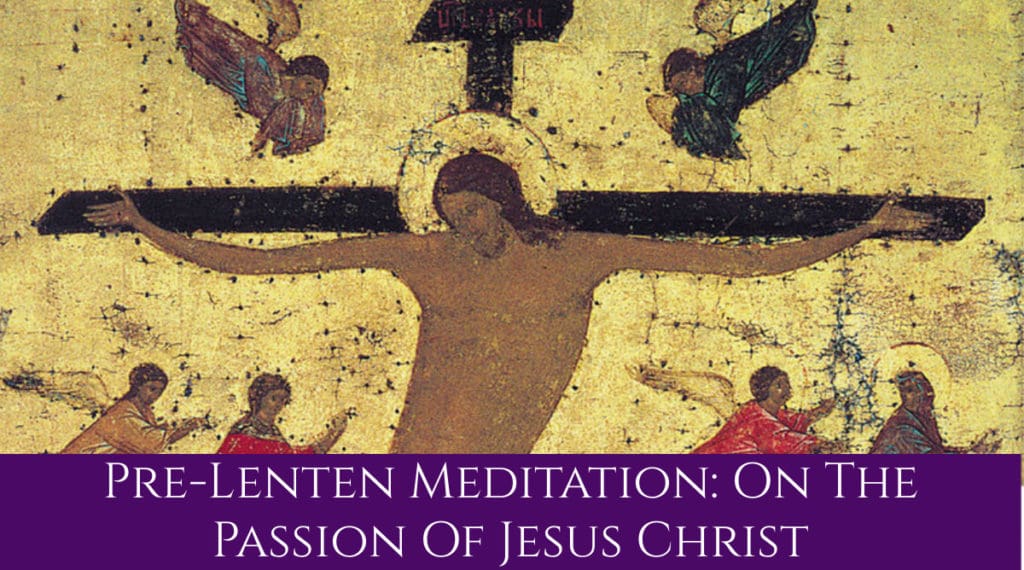Authors Introduction: This is the second of a series of meditations based on the Lenten Votive Masses of the Passion of Jesus that have been prayed throughout the history of the Church in various usages. Some have their origin in early medieval times and were used in various places in Europe and in particular religious orders. Some can be found in the 1955 and 1962 editions of the Missale Romanum. Some parallel prayers can be found in the current English edition of the Roman Missal as well as the Missal of the Holy Land. These meditations are given to offer us an old yet new way to enter into the Passion of Jesus and the salvation He offers us that is rooted in scripture, tradition, and history of the Church. May praying with and reflecting on them help you to grow in Divine Intimacy with Our Lord Jesus and His saving graces this Lenten season and whenever you enter into prayer.
The text of this mass setting can be found here.
Opening Collect: Almighty and everlasting God, Who as a pattern of lowliness for mankind to follow, brought our Saviour to take flesh and undergo the cross: mercifully grant that as we celebrate the solemn commemoration of His Passion, so we may also deserve to have the schooling of His longsuffering and partnership of His resurrection.
The passion and death of Jesus Christ on the cross is the hinge of human history and the ultimate fulfillment and crescendo of God’s plan of salvation. It is the culmination of the ultimate purpose of the Incarnation, the hour for which God the Father sent him into the world. Something crucial for our meditation on the passion of Jesus is that we see his love and humble obedience to the Father at the core of his own identity and mission.
Pope Benedict XVI describes the fulfillment of Jesus’ mission in his passion as where we see “the very process of passing over, of transformation, of stepping outside the limits of fallen humanity.” (Jesus of Nazareth-Holy Week, 54-55) In this unmerited gift of salvation that Jesus freely gives me by his passion, I am reconciled to the Father from whom sin once separated me. Like the younger son who squandered his inheritance in the Parable of the Prodigal Son, we are brought back into the family of God through divine mercy poured out freely for me. In this free act of love given to me by Jesus, the prophecy of Zechariah is fulfilled. “They shall look upon him whom they have pierced: and they shall mourn for him as one mourns for an only son, and they shall grieve over him, as the manner is to grieve for the death of the firstborn.” (Lesson – Zech 12:11)
In his humble, total giving of self unto death, Jesus transforms each of us into children of God. He brings us back into union with the Holy Trinity and restores all humanity to the family of God, the New Israel, his Church, the Communion of Saints. Jesus’ humble obedience in unto death reveals we are no longer the sum of our failures and sins nor are we enslaved to them any longer. The debt of sin has now been paid. They now have been transformed by the Passion into an opportunity for healing and for union with the God who loves us so much he allowed us to pierce his humanity. Jesus’ humility unto death leads him to bear untold suffering for the sake of love.
Saint Paul speaks of the humility of Jesus that brings us salvation in the following manner, “Our Lord Jesus Christ humbled himself unto death, even to the death of the cross: for which cause God also has exalted Him and has given Him a name which is above all names.” (Introit – Phil 2:8-9) In commenting on the nature of Jesus’ humble obedience to the Father’s will in his passion, Saint Thomas Aquinas states:
The manner and the sign of his humility is obedience, whereas it is characteristic that the proud to follow their own will, for a proud person seeks greatness. But it pertains to a great thing that it not be ruled by something else, but that it rule other things; therefore, obedience is contrary to pride. Hence, in order to show the greatness of Christ’s humility and passion, St. Paul says that Jesus became obedient; Because if he had not suffered out of obedience, his passion would not be so commendable, for obedience gives merit to our own sufferings. But how was he made obedient? Not by his divine will, because it is a rule; but by his human will, which is ruled in all things according to the father’s will: nevertheless, not as I will but as you will (Matt 26:39). (Commentary on the Letter of Saint Paul to the Philippians, C2, L2, 65)
Often we are tempted to think of humility purely as a negative virtue. Yet the humility that Jesus fully embodies in his passion bears witness to the truth of who God is and who we are before him. (cf. CCC n. 559) Humility acknowledges our nothingness and total dependency on God for everything and that without him, we cannot be saved from our sins by our strengths and egos alone. It also acknowledges the fact that salvation is a great gift that is freely given at the great cost of the blood of Christ, pierced and poured out because of our sins. Yet humility also acknowledges God the Father, in Jesus His son, pursues after me in love to offer me salvation, healing, and restoration of my identity as his beloved child. He does not leave me alone. In humbly uniting my frailty and weakness to Jesus’ own gift of humble obedience and love, I am transformed by His grace given to me in the blood and water that flowed from his wounds. Humility and loving obedience to the will of God enables me to see that in His saving plan manifested in my life nothing is solely just about me. In the humility of faith, I can see that I do not suffer in a vacuum nor receive consolations in a vacuum. Everything I face in life is given to me by God as an opportunity to abide in His love and to draw others into its saving mystery. This also is why I am encouraged by the Church to be generous in my Lenten Sacrifices of prayer, fasting, and almsgiving. When I empty myself in humility in these actions through grace like Jesus did in his passion, I can come out of my comfort zone and limits to see that who God created me to be is more than what I perceived them to be. I am strengthened by his grace to receive his love and share it with others in ways that I thought were impossible. When viewed in this light, my Lenten sacrifices and my past sins and struggles can become a path to salvation and healing in a way that has eternal consequences for me, the church, and the world.
The piercing of the Most Sacred Heart of Jesus on the cross shows me that the way of faith embraced in the interior life is never lived just for me alone (Gospel – John 18:28-35). My salvation ultimately is tied to the salvation of others. My individual following of Jesus becomes a link in a chain, a connection between persons. Even when I am in darkness or when I notice others’ sins, faults, and evils, I am called to echo Jesus’ total love unto the end. The piercing of Jesus’ heart on the cross also shows me that faith in him is not just about my own ideas, opinions, and theories of the faith alone. Faith is an incarnate reality, a lived relationship that shapes who I am. (Jesus of Nazareth-Holy Week, 225-226) This relationship like so many in my life can only endure insofar as I am able to receive Jesus’ complete total gift of love and allow it to permeate who I am. A relationship can only endure through making time for the one whom I love, listening to them, and then receiving them. The same is true with my own relationship with Jesus in faith. I allow it to endure and grow when I am personally present to Him at mass and daily prayer, I am attentive interiorly in my heart to His voice by listening to the Gospel proclaimed by his Church, and receiving him worthily in the Eucharist every Sunday and every time I pray. When I prioritize this relationship by making it the foundation of my life, the humble love unto death that Jesus gives for my behalf in his passion then becomes the anchor that can help me to remain in his grace and peace, no matter what crosses I may face in life. Considering his great gift of love that Jesus has given to us, we pray that we may receive the grace to humbly surrender and entrust all that we have before His passion at every mass we attend and so receive the fulness of the salvation that he longs to give us.
Image: Crucifixion of Jesus by Dionisius, Public domain, via Wikimedia Commons




